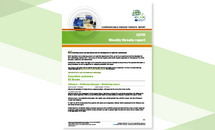Communicable disease threats report, 30 September - 6 October 2012, week 40
The ECDC communicable disease threats report is a weekly bulletin intended for epidemiologists and health professionals in the area of communicable disease prevention and control. Summarising information gathered by ECDC through its epidemic intelligence activities regarding communicable disease threats of concern to the European Union, it also provides updates on the global situation and changes in the epidemiology of communicable diseases with potential to affect Europe, including diseases that are the focus of eradication efforts.
Executive Summary
A large gastroenteritis outbreak (more than 10 600 cases) has affected kindergarten and school children in Germany in five federal states in eastern Germany: Brandenburg, Berlin, Thuringia and Sachsen and Sachsen-Anhalt. More than 100 schools and child-care facilities are involved. According to the Robert Koch Institut (RKI) this is the largest known food borne outbreak in Germany, there is mounting evidence that the outbreak is currently over.
Another threats that the CDTR reports on this week is the increase in the number of Salmonella Thompson in the Netherlands. A case-control study performed last week showed a relation with consumption of smoked fish and with buying groceries in certain supermarkets. In parallel, the United States and Canada are currently investigating an outbreak of S. Thompson with 113 and 105 cases respectively identified in each country since the end of June.
This week the Portuguese health authorities reported two confirmed cases of dengue in Madeira archipelago that could be locally acquired. In Greece, the previously reported potential autochthonous has been definitively confirmed to be a false positive.
The ECDC communicable disease threats report is a weekly bulletin intended for epidemiologists and health professionals in the area of communicable disease prevention and control.
Download





